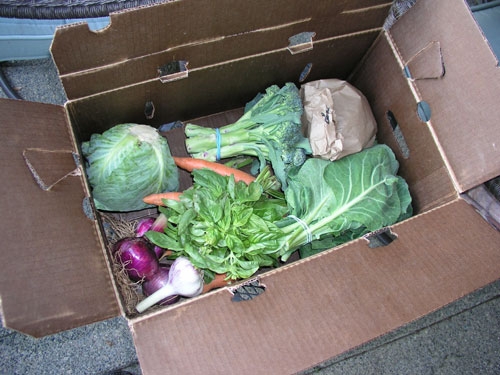Posts Tagged: Julian Alston
GMO labeling is costly proposition for California
Proposition 37 would result in $1.2 billion in higher costs for farmers and food processors, higher prices for consumers and new regulations, according to an article published in Western Farm Press that refers to a new UC Davis study. The article is credited to the No on 37 campaign.
If passed, Proposition 37, which is on California's November ballot, would require labeling of genetically engineered food.
“The proposed regulations have no basis in science and impose rules that would have significant costs for food producers, processors and marketers, and ultimately for consumers, while providing misinformation and no demonstrable benefits,” the article quotes Julian Alston and Daniel Sumner, professors in the Department of Agricultural and Resource Economics at UC Davis.
An editorial in the Los Angeles Times notes that the work for the study was undertaken with partial funding support from No on 37.
"That doesn't mean the study is without interest for voters," wrote Karin Klein in the editorial.
'Food stamps' can't be blamed for the obesity crisis
Members of families that receive benefits from the U.S. Supplemental Nutrition Assistance Program (formerly known as food stamps) are more likely to be overweight or obese than people in families that don't receive the federal food assistance, according to a UC Davis study cited by ABC News. However, the research doesn't say its the food assistance that is making them fat.
The argument that excluding "unhealthy" items - like candy, soda and chips - from the supplemental nutrition program would make participants healthier "is not a lay-down hand at all," said Julian Alston, professor in the Department of Agricultural and Resource Economics at UC Davis.
"You can restrict how people spend their stamps but not change their total consumption," he said. Also, manufacturers will tweak their products to try to get around the prohibition. "They will re-engineer the food," Alston said.

Limiting 'food stamp' purchases to healthful items won't make participants healthier.
Growers can find strength - and profit - in numbers
Multi-farm community-supported agriculture programs, cooperatives and pools under a common label are some ways small- to medium-sized operations can reach new customers interested in local produce, wrote Renee Stern in The Grower.
Together, growers can offer enough volume or range of crops to attract retailers, foodservice outlets or institutions that might be out of reach for each individual farm.
Stern included comments from a wide variety of experts in her article, including marketing professionals, small-scale farmers, a co-op manager and Shermain Hardesty, UC Cooperative Extension specialist at UC Davis with expertise in agricultural economics.
She told the reporter that someone — ideally one of the producers — needs to take charge of the collaborative marketing program, but finding someone with the time, aptitude and inclination may mean hiring a manager.
Do farm subsidies cause obesity?
Christopher Shea, Wall Street Journal
The link between agricultural subsidies and obesity is highly tenuous, according to a UC study that analyzed the effects of price supports on diet. The study, authored by Bradley Rickard, Abigail Okrent and Julian Alston, says if all subsidies were magically erased — including trade barriers — the typical American adult would actually respond by eating about 3,000 to 3,900 additional calories a year.
Alston is an agricultural economics professor at UC Davis, Richard is with Cornell, Okrent is a Ph.D. candidate at UC Davis.
Farm subsidies are not to blame for the obesity crisis
The common notion that the federal government is contributing to the obesity epidemic by providing billions of dollars in annual subsidies to farmers doesn't pencil out, according to UC Davis agricultural economist Julian Alston.
Alston was featured in a six-minute NPR story about farm subsidies yesterday. The story largely dispelled the theory that federal subsidies encourage farmers to grow too much grain, causing commodity prices to drop, making food cheaper and inviting people to eat too much.
Alston said improved agricultural productivity is responsible for cutting the price of food.
"Food productivity is more than doubled, so the real cost is less than half what it was 40 to 50 years ago," he said. "That's the big story. And that wasn't caused by subsidies. That was caused by improvements in productivity on the farm."
Farm subsidies do not necessarily make food cheaper.
"The net effect of the whole set of farm supports is to make food more expensive and actually to discourage obesity," Alston said.
Margo Wootan of the Center for Science in the Public Interest, another expert who contributed to the story, said the food environment created by America's food manufacturers and marketers has more influence on consumers' waistlines. Food ingredient costs are small compared to the cost of processing, packaging, transportation, marketing and merchandising.
Wine alcohol content frequently under reported
Wine enthusiasts are taking note of a recent study by UC Davis agricultural economist Julian Alston and his colleagues that said the amount of alcohol in wine isn't always stated accurately on the label.
The San Francisco Chronicle's restaurant blog, "The Inside Scoop SF," reported on the study, which said that nearly 60 percent of wines under reported their alcohol, while just 10 percent reported accurately. Overall, alcohol levels were under reported by a mean 0.13 percentage points across the board.
Writer Jon Bonné contemplates whether winemakers are trying to bridge a divide between consumers who say they want less alcohol, but are buying wines that have more.
"I’m not sure that explains the mislabeling, which has a lot of complex components (cost savings, consumer bias, regulatory leeway) but it’s an increasingly frequent conclusion. It’s what the study’s authors concluded," Bonné wrote.
The U.K. newspaper The Guardian reported that winemakers have deliberately chosen to understate wine alcohol content for marketing purposes.
"The substantial, pervasive, systematic errors in the stated alcohol percentage of wine are consistent with a model in which winemakers perceive that consumers demand wine with a stated alcohol content that is different from the actual alcohol content, and winemakers are willing to err in the direction of providing consumers with what they want," The Guardian quoted the Alston study.
"What remains to be resolved," the study says, "is why consumers choose to pay winemakers to lie to them."

Wine alcohol content is becoming more of an issue.



